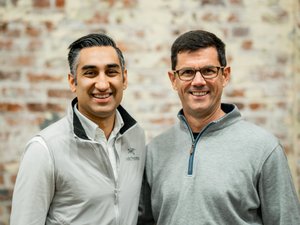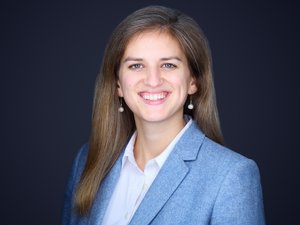
What did you miss at Pitch Breakfast last week?
First, we heard from:
- A platform that creates a free-market health care system that allows transparency and choice, connecting employers, providers and patients
- A tool for helping people get others gifts they actually want through affiliate links
- A secure mobile messaging system and workflow app that simplifies clinician-to-clinician communication, serving organ transplant centers and organ procurement organizations
- Software and hardware helping engineers responsible for scheduling road maintenance.
The four founders behind these startups were given five minutes to make their pitch last week before a panel of judges. This week, that panel included:
- Terry Cox, president of CEO of BIG (Business Innovation & Growth).
- Garth Moulton, co-founder of Jigsaw
Here were the main takeaways from last week.
Qualify your success
Eric Kirsch is the founder of Beacon Healthcare Benefits, the platform creating a free-market health care system. A former physician’s assistant and owner of a practice who was frustrated with the traditional health care model, Kirsh is building a commercial application and free market for health care by providing transparency and choice to customers. The company provides a direct connection between providers and those seeking and paying for health care.
“To make this idea work, I decided to work on the brand of fixing health care, being transparent and creating a free marketplace,” Kirsch explained.
Kirsch touches all facets of health, including technology, coding/billing, marketing and the sales aspects of health care. The company wishes to lower costs for everyone and increase access for patients.
During his pitch, Kirsch describes how the young and fast startup is gaining traction, closing 19 contracts with medical practices since launching three months ago. These contracts mean that 44 doctors have agreed to primary care in the membership model.
“We have over 2,000 employees signed up, and we expect about 5,000 by the end of the year. [It’s] a very scalable solution that is mostly automated. Just myself, part-time, I will bring on about 5,000 employees by the end of the year,” Kirsch said.
That resonated for the judges, more so than the 5,000 number on its own.
“It’s very impressive the number you put out there being part-time,” said Moulton.
And it highlighted an important aspect of every pitch: qualify your success. As Moulton noted, 5,000 is a good number to hit, but it’s all the more impressive that Kirsch will get there working part-time. It shows the potential for significant growth, and that’s what investors want to see.
Understand customer behavior
John Hall, the founder of Gift Pick, has a background in statistical modeling and is creating a crowdsourcing tool for gifts. He wants to help people get gifts that others actually want. Hall plans to launch this holiday season.
“It’s a new way of doing things. I’m creating gifts and asking to get feedback on them, then I’m purchasing them. It hasn’t been done,” Hall explained.
Both panelists expressed concerns about his strategy and how he will reach people.
“I would rather somebody say, ‘Here is my gift folder, and you throw everything you want in there,’” Cox said “You are thinking [they] don’t know what [they] want.”
Moulton expressed concern that Hall’s customers would behave the way he wants them to.
“What I would want is your collective knowledge that you gather because there is no way in hell you will get my crusty CIO customer to go on some website and say what he might want as a gift from a vendor,” Moulton said. “But if there is a place where I can go and see what other crusty CIOs have gone and said they like, that would be super valuable.”
Moulton ended with tough comments.
“Let me be honest, this feels like a stretch. It feels like you are swimming upstream for basic human nature,” Moulton said.
The perfect pitch does exist
Dalton Shaulla, a medical student, is the CEO of HealthTech Solutions Inc., a startup that created the only secure, HIPAA-compliant communication system dedicated to assist organ procurement organizations and transplant centers.
Shaulla’s passion to innovate in the transplant industry originated from personal experience: He had a near-fatal motorcycle accident and had to undergo an experimental transplant.
Now, Shaulla wants to save time and the amount of organs that are discarded due to communication problems.
“The main takeaway is the supply chain is broken. There is no current platform that is secure for them to exchange information in real time. The key takeaway is that it is multi-institutional and multi-organizational. Players are currently using IM, email and fax,” Shaulla explained.
Shaulla said the HealthTech Solutions subscription solution has facilitated over 100 life-saving transplants. The company hopes to test a transaction model in the near future. Today, the company’s first paid clients are in Iowa, Michigan and Ohio.
There were some regulatory concerns, but both panelists agreed Shaulla hit on the most important points: his background, why he has interest and the experts involved.
“Great job. Really well done,” Cox said, “I would definitely raise more money.”
For more stories like this, subscribe to StartCharlotte’s free weekly startup newsletter.








